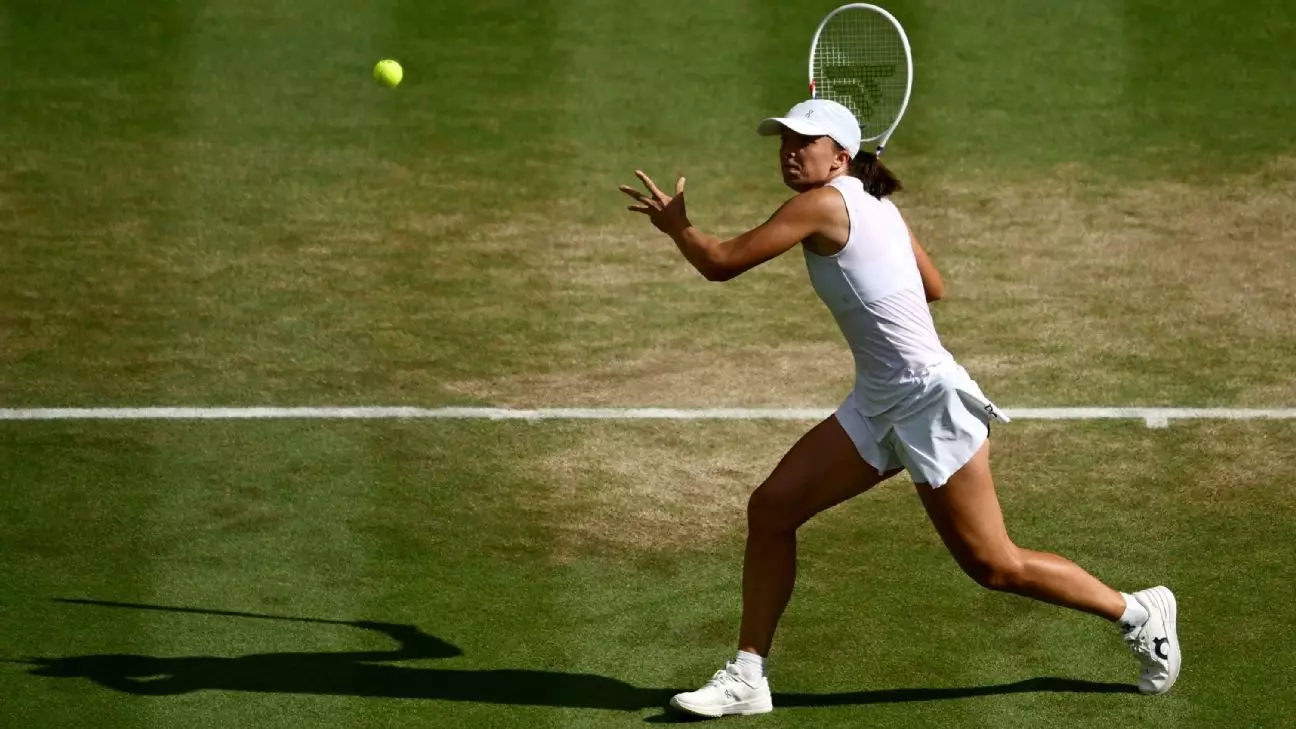Iga Swiatek’s recent victory at Wimbledon, marked by her swift, commanding win over Amanda Anisimova, has been heralded by many as a showcase of dominance and greatness. Yet, beneath the veneer of her seemingly effortless conquest lies a narrative that deserves critical examination. Her victory, styled as historic due to the rare double-bagel scoreline, obscures the deeper complexities of her journey, the sport’s ruthless nature, and the inflated expectations placed on young athletes. The relentless pursuit of perfection, exemplified by her clean sweep, often masks the exhausting toll of professional tennis — where resilience is just as vital as talent.
While the media celebrates her sixth major title, it’s crucial to recognize the context that tempers this triumph. Swiatek, at just 24, already stands among an exclusive club winning on all three surfaces. But this achievement, impressive as it is, risks becoming a superficial badge of honor when disconnected from her psychological pressures, injury history, and her past controversies. Her doping ban—a one-month suspension due to contaminated medication—reminds us that her success does not come unblemished. A sport that champions resilience must also scrutinize its stars’ vulnerabilities, not just their stats.
The Illusory Power of Youth and the Myth of Invincibility
Swiatek’s dominant performance on Centre Court exposes the sometimes misleading narrative of youth as an inevitable harbinger of victory. Her quick ascent and comfortable win might suggest that she’s invulnerable, but this oversimplification ignores the fragile edge of sports excellence. Tennis legends, from Serena Williams to Federer, have illustrated that career longevity and mental stamina transcend raw talent. Swiatek’s rapid rise might project confidence, but it also risks glossing over the mental health challenges and psychological fatigue inherently woven into such intense competition.
Furthermore, her status as the first Polish player to win Wimbledon significantly amplifies the national narrative, but it also creates a pressure cooker of expectations, which can be as exhausting as the grind of the sport itself. The doubles of celebration and critique collide, because while her achievements are celebrated, they also set a benchmark that fuels the relentless human obsession with perfection and records. The glowing narrative can sometimes obscure the cost paid in personal well-being and mental health.
Unmasking the System’s Embrace of Young Talent and the Hidden Costs
What’s striking—and somewhat troubling—is how tennis and its governing bodies often prioritize young stars’ marketability and legacy potential over their holistic well-being. Swiatek’s victory not only elevates her profile but inadvertently perpetuates a narrative that youth and dominance are inseparable. While this can inspire aspiring players, it also pressures them to perform within a narrow window, risking burnout and loss of enjoyment. Her story reflects the broader systemic issue: a sport that venerates victory but often neglects the importance of mental health, athlete sustainability, and the need for a more inclusive, less taxing competitive environment.
Her confrontation with the media glare after her doping controversy further underscores this paradox. While the incident was minor and deemed inadvertent, the emphasis on clean sport and image management reveals an underlying tension between talent, reputation, and scrutiny. It’s essential to question whether the current tennis landscape encourages athletes to flourish or whether it simply demands relentless excellence at all costs, often at their expense.
Who Truly Benefits from the Narrative of Unstoppable Success?
The celebration of Swiatek’s victory, while justified in many ways, also raises critical questions about the narratives we construct around sports heroes. Is society truly celebrating resilience and perseverance, or are we increasingly captivated by manufactured stories of invincibility? Her swift triumph reinforces the idea that young talent can effortlessly conquer the pinnacle of sport, yet it downplays the years of sacrifice, the mental battles, and the structural pressures that accompany such ascent.
The broader societal implications are undeniable. Elevating athletes like Swiatek as paragons of perfection can distort our understanding of human value and achievement. It risks fostering an environment where mental health issues are stigmatized or ignored, as athletes are expected to ‘just win.’ Meanwhile, those who stumble or fail to meet expectations are dismissed or marginalized. A more nuanced appreciation would recognize that behind every victory lies a complex tapestry of human effort, vulnerability, and the constant battle to maintain authenticity in a landscape obsessed with perfection.
In the end, Swiatek’s Wimbledon victory, remarkable as it is, provides a stark reminder of the pitfalls of idolization in modern sports. While her talent and achievement deserve respect, they also prompt us to examine the broader system that elevates performance over well-being and the stories we tell ourselves about greatness. The quest for victory, in its purest form, should not come at the expense of the athlete’s integrity or mental health—a lesson that the sport, and society, needs to embrace more openly.


Leave a Reply